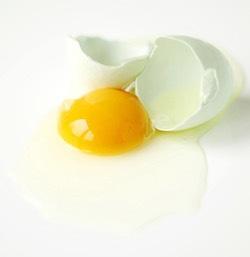
It can be tough to determine whether eggs are healthy.
For years, many researchers said that dietary cholesterol led to an increased risk of cardiovascular disease (1, 2). Some low-fat diet fads shun egg consumption.
However, U.S. egg producers run the American Egg Board, which put out the “Incredible Edible Egg” ad campaign (3). This campaign attempts to educate consumers about the health benefits of eggs.
Are eggs healthy or not?
They’re actually one of the most nourishing foods you can eat. I'll explain why.
Test your knowledge now or come back after reading this article to check your learning:
Aren't Eggs Bad for Your Heart?
People have stayed away from eggs because they’re high in cholesterol. One large egg does contain about 211 mg of cholesterol (4). As a comparison, a five-ounce hamburger made from ground beef with 80% fat only contains 100 mg of cholesterol in the meat itself (5).
However, in healthy humans, the consumption of dietary cholesterol does not dramatically affect the levels of cholesterol in the blood.
Our intestines have a lining that blocks the absorption of cholesterol from the foods we eat (6).
While some people have a rare disorder that allows them to absorb excess amounts of cholesterol, most people do not. Metabolism of fats and cholesterol varies from person to person (7).
In fact, 70% of people experience no change or only a minor change in blood cholesterol levels after eating cholesterol-rich foods (8).
In addition, researchers think that cholesterol levels in the blood don’t necessarily predict the risk of coronary heart disease.

Some studies have found that the concentration of atherogenic lipoprotein particles, not cholesterol, in the blood is a better predictor of coronary heart disease (9).
While eating eggs won’t necessarily raise your cholesterol levels, eggs have been shown to positively affect the type of cholesterol in your blood.
In fact, when people do experience an increase in blood cholesterol levels after eating eggs, HDL (‘good’ cholesterol) levels increase (8).
LDL (‘bad’ cholesterol) can be present in the form of small, dense particles or larger particles. It’s the small, dense particles that are mainly associated with cardiovascular disease (10).
Eating eggs can transform the small, dense LDL particles in your blood to larger, less dangerous particles. This is especially effective when egg consumption is combined with a low-carbohydrate diet (8, 11).
The larger particles also transport beneficial carotenoids, which are beneficial for eye health and can help reduce the risk of macular degeneration associated with age (11).
One meta-analysis investigated 17 prospective studies that had looked into the correlation between egg consumption heart disease and stroke. The researchers found that there was no significant correlation between eggs and either condition in healthy individuals (12).
This information isn’t new. Many studies have come to the same results (13).
KEY POINT: The idea that eggs are bad for your heart health is a myth. In healthy people, eggs can actually be beneficial for your cardiovascular wellbeing by raising HDL levels, and increasing the size of LDL particles.
Eggs Are Antioxidant-Rich

You might be aware that many fruits and vegetables are loaded with antioxidants. Did you know that eggs are rich sources of antioxidants too? If you’re eating an apple a day for your health, you might want to consider replacing it with a couple of egg yolks.
Two raw egg yolks contain almost twice as many antioxidant properties as an apple (14). The downside is that the antioxidant properties decline by about half when you cook the yolks.
Two of the antioxidants found in eggs are the amino acids tryptophan and tyrosine (15).
Tryptophan and Tyrosine
Tryptophan is not created in the human body. It can only be obtained through the diet.
It is an essential amino acid that’s necessary for protein synthesis, nervous system health and overall growth and development.
Insufficient tryptophan in the diet can lead to mood disorders like depression and anxiety (16).
Tyrosine aids in the creation of dopamine and noradrenaline (17).
Tyrosine can help people manage stress, regulate their moods, manage cardiovascular function and control appetite (16).
Lutein and Zeaxanthin
Have you ever wondered what makes egg yolks so bright?
The antioxidants lutein and zeaxanthin contribute to the color of an egg yolk, which can range from off-white to bright red.
Some farmers add extracts derived from marigolds and red peppers to chicken feed to ensure brightly colored yolks (18).
Eggs are a plentiful source of lutein and zeaxanthine antioxidants. Eating eggs can raise the levels of these antioxidants in the blood, helping to protect against eye problems like cataracts and macular degeneration (19, 20, 21, 22).
KEY POINT: Eggs are full of antioxidants that can help you protect your eye health, manage your moods and even control appetite.
Infographic (Pin, Share or Embed)

Share This Infographic On Your Site
<p><a href='https://www.authoritydiet.com/why-eggs-good-bad-for-you-healthy-unhealthy/'><img src='https://www.authoritydiet.com/images/i/eggs-good-infographic-hd.jpg' border='0' /></a><br /><strong>Please include attribution to AuthorityDiet.com with this graphic.</strong></p>
The Nutrients in Eggs Are Hard to Beat
Every egg varies in its nutritional content. The nutrients in an egg are largely based on the hen’s health and diet (23).
If you only eat egg whites, you’re missing out on many of the nutrients that are available in an entire egg. A whole egg is a nutritional powerhouse.
One large hard-boiled egg contains the following nutrients (24):

- Calories: 77
- Fat: 5 g
- Protein: 5g
- Choline: 113 mg
- Vitamin A: 293 IU (6% DV)
- Iron: 0.6mg (3% DV)
- Calcium: 25 mg (2% DV)
- Folate: 22 mcg (5% DV)
- Phosphorus: 86 mg (9% DV)
- Potassium: 63 mg (2% DV)
- Vitamin B12: 0.6mcg (9% DV)
- Pantothenic Acid: 0.7 mg (7% DV)
- Riboflavin: 0.3 mg (15% DV)
- Vitamin E: 0.5 mg (3% DV)
- Zinc: 0.5 mg (4% DV)
- Selenium: 15.4 mcg (22% DV)
Egg whites do contain some important nutrients. There are at least 78 confirmed proteins in egg whites (25). The white contains 80% of the egg’s total protein content (26).
The proteins in egg whites may also help combat anemia. In one study conducted on rats, adding egg whites to an iron-deficient diet helped the body absorb iron (27).
However, the proteins in the yolks delayed absorption of iron. People with anemia might benefit from eating whites without the yolks for this reason.
The yolks contain the egg’s fat. About 38% of the fat in eggs is monounsaturated. Approximately 16% is polyunsaturated. About 28% is saturated.
Much of the fat found in egg yolks is made up of omega-3 fatty acids. Omega-3 fats are extremely healthy.
Consuming adequate amounts of omega-3 fats can help combat postpartum depression, improve the behavior of children with ADHD, lower the risk of developing dementia and lower the risk of cardiovascular disease (28, 29, 30, 31)
In addition to packing in proteins and good fats, eggs are a rich source of choline. One egg has 113 mg of the essential nutrient.
Choline helps make up the fats in the blood and the cells of the body. It also turns into acetylcholine, a neurotransmitter that helps with learning (32). Choline deficiency can cause fatty liver (33).
Even though choline is crucial for many functions within the body, 90% of people in the U.S. may not eat enough of the nutrient (34).
When the hens’ diet is supplemented with certain omega-3 fatty acids, they produce eggs that are enriched with omega-3s.
Eating omega-3-enriched eggs can help control blood triglyceride levels, which can lower your risk of cardiovascular disease (35, 36).
In one study, participants who added two omega-3 rich eggs to their diet every day for 18 days saw a reduction in their plasma triglyceride levels (37).
KEY POINT: Eggs contain many nutrients that are crucial for your health, including choline, protein and omega-3 fats.
Eggs Contain Ideal Ratios of Amino Acids

Proteins are essential for the development of the body. They are valuable in creating tissues and molecules that help your body grow, move and function healthfully. Amino acids are often referred to as the building blocks of protein.
Experts suggest that you should eat about 0.36 grams of protein per pound of body weight (38).
This number can help you stay alive, but it’s not necessarily ideal. Most people need to eat more protein, depending on their age, weight and activity level (39, 40, 41, 42).
Eggs are exceptional source of protein. Going by the basic USDA protein suggestions, a 150-pound woman who eats two eggs a day will consume more than 20% of her protein needs from eggs alone. That’s an easy way to get in additional protein without consuming many additional calories.
Eggs contain nine essential amino acids and are considered to be one of the best quality sources of proteins, especially when compared with vegetable protein (43).
Essential amino acids are not produced by the body, so the only way to introduce them into our systems is through food or supplements (44).
Consuming enough protein can help you achieve the proper balance of muscle and fat in the body (45, 46).
Some studies have found that dietary protein can also help you lower your blood pressure. However, one study found that animal protein may not be as effective as plant protein for hypertension control (47).
Dietary protein can also help protect your bones. The protein that you eat helps your body retain calcium and use it to create strong bones (48).
KEY POINT: Eggs are an excellent source of essential amino acids, which are not created in the body and must be consumed in order for you to stay healthy.
Eggs May Help You Lose Weight
Eating eggs can help you lose weight in a variety of ways.
When you eat more protein without increasing your total calorie intake, you boost your metabolism (49, 50). This allows you to continue burning more fat throughout the day.
Combining eggs with a low-carbohydrate diet, even if you still consume the same amount of fat, can help your body burn more fat and even curb your appetite (51).

In one study, participants ate a breakfast that consisted of either eggs or bagels. Each breakfast contained the same number of calories.
The people who ate eggs reported feeling more full. They also consumed fewer calories for 36 hours following the egg breakfast than those who ate bagels (52).
After 12 weeks, the egg breakfast group compared to the bagel breakfast group saw (53):
They also experienced 16% greater reduction in percent body fat but the result was not considered significant.
The Satiety Index is a system that measures the ability of different foods to satisfy hunger. It is based on a study in which participants ate 240 calories worth of different foods and then rated their hunger levels for a fixed time period. Eggs were considered to be high-satiety foods (54).
If you feel more satisfied from the foods that you eat, you’ll probably snack less.
One food that ranks slightly higher than eggs on the Satiety Index is whole-grain pasta.
However, 240 calories worth of cooked whole-grain pasta equals one and a half cups (55). To eat that many calories in eggs, you’d have to eat about three and a half eggs.
I know that when I fill my bowl with pasta, I usually eat much more than a cup and a half, yet I rarely eat more than two eggs at a time.
Studies consistently show that low-carb diets can help you lose weight (56, 57, 58). Because eggs contain negligible amounts of carbohydrates, they are an ideal and convenient addition to a low-carb diet.
KEY POINT: Eggs make you feel fuller than many other foods and can be a great addition to a low-carb diet.
What About Salmonella?

Even when they’re fresh and intact, eggs may contain Salmonella, a type of bacteria that can cause food poisoning.
However, the risk of getting seriously sick from eggs is relatively low. To put things in perspective, only 30 deaths a year are caused by Salmonella (59).
If you purchase pastured eggs from a local farmer, they’re less likely to have Salmonella. That’s because eggs form most large commercial egg farmers in the U.S. are washed before they’re sold.
This cleansing process removes the cuticle, a natural substance that the hen secretes onto the egg to protect it from contamination (60, 61).
In Europe, it’s illegal to wash eggs before selling them. In addition, European egg marketing regulations state that if you refrigerate eggs and subsequently leave them out at room temperature, the accumulation of condensation could stimulate bacteria growth (62).
To ensure American consumers’ safety, the FDA has enacted regulations to reduce the risk of contamination at the farm as well as during shipping and storage.
How to Reduce Risk of Contracting Salmonella
- Inspect the eggs before purchasing to make sure the shells are intact.
- Store eggs in the original packaging.
- Use eggs within three weeks of purchase.
- Eat hard-boiled eggs within one week of cooking.
- Freeze whole eggs without the shell and eat within one year of freezing.
- Cook eggs until the whites and yolks are firm.
- Never leave cooked egg dishes outside of the refrigerator for more than two hours.
KEY POINT: Eggs are generally safe to eat. You can reduce your risk of contracting salmonella from eggs by following safe handling and cooking instructions.
Eggs Are Good for Your Health
The idea that you need to limit your egg consumption in order to keep your cholesterol levels down is a myth. Of course, too much of anything is never a good thing. Eating 38 eggs a day might be a bit too much.
Eggs contain many nutrients in a small container, and they’re filling. Eating a couple of eggs for breakfast can even help you lose weight.
The ratio of amino acids in eggs is ideal for human consumption. In addition, eggs contain antioxidants that can benefit your heart and eye health.
Eggs from a local, pastured source may even be healthier and safer to eat than those that are mass-produced.
If you’ve been avoiding eggs because you’re afraid they’re bad for you, maybe you should incorporate them into your diet and see what you’ve been missing.

